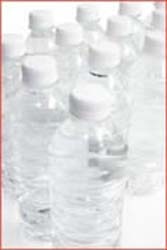 Holiday cheer may include a drink or two. So, if you raise your glass in a toast, be sure to stay hydrated with water this season, too. This clear liquid is vital to your health, not just around holiday time, but throughout the year.
Holiday cheer may include a drink or two. So, if you raise your glass in a toast, be sure to stay hydrated with water this season, too. This clear liquid is vital to your health, not just around holiday time, but throughout the year.
Why water is important to the human body
- The human body is comprised of nearly 70 percent of water; 80 percent of blood is comprised of water and 75 percent of muscle.
- Humans can go nearly 2 months without food, but less than half a month without water.
- Water is essential to flush toxins and waste product from your body.
- Water assists with digestion and carries nutrients throughout our body.
- Water cushions our internal organs.
How much is enough?
We have all heard that we need to drink at least 8 glasses of water a day. As unique as we all are, can it really be that there’s a universal formula that applies to us all? Of course not!
Hydration is best determined by the level of physical activity and the type of environmental exposure (whether it’s hot/humid conditions, etc.) you endure. The more you sweat, the more you need to replenish fluids by drinking water. You can best determine your own levels of water requirement by checking the color of your urine. If it’s light and nearly clear, then you’re getting enough water, if it’s dark, then drink up, although be aware that certain vitamins and supplements darken your urine which might skew your results.
Oftentimes we mistake thirst for hunger. If you feel mild hunger pangs when you shouldn’t, reach for a glass of water first, and you might be surprised to find you’re no longer hungry. If you drink only when you’re thirsty you might be on the border of being dehydrated, so don’t wait till you’re parched to drink water.
Good hydration discipline
- Drink a glass of water before you go to bed at night, and then first thing in the morning, going eight or nine hours without water is a long time.
- Be sure to drink water prior to and during exercise. It’s a good idea drink one or two ounces every fifteen minutes.
- To identify how much water you lose during exercise, step on the scale before your workout, don’t drink any water during your workout, and then step back on the scale after you finish. The loss of weight is the loss of water and is the amount you need to be cognizant of replacing during your exercises in the future.
- Keep a bottle of water in your purse and another in your car at all times.
- Caffeine and alcohol are diuretics so be sure to compensate for that by drinking additional water.
- Healthy foods like fruits, juices, soups and vegetables all contain varying degrees of water that aids in the replenishment of lost fluids.
- If you drink a glass of water before a meal, you’re more likely to eat less since you get full quicker.
- Don’t just drink when you’re thirsty. Drink continually all through the day. If you’re not used to that, set a target for yourself to drink eight ounces of water per hour, every other hour.
What constitutes fluids?
In 2004, the institute of Medicine (IOM) of the National Academies of Sciences established new water intake recommendations after two years of examining hundreds of scientific studies. They concluded that 81 percent of your hydration should come from drinking water and other beverages (including coffee and tea). The remaining 19 percent should come from foods — especially fruits and vegetables, which are 80-99 percent water. Diets rich in produce also help maintain a healthy electrolyte balance.
There are many energy drinks and sports drinks and even flavored water to assist you to stay on course to meet your ‘target’ 64 ounces of fluid a day. But unless you are engaging in more than sixty minutes of strenuous activity you have no reason to drink the high-calorie, laced-with-simple-sugar energy drinks. The newly touted flavored waters do nothing more than add a few additional calories and a fair amount of sodium to your diet, neither of which are necessary unless you’re running a marathon or doing other endurance exercises.
Is there such a thing as too much water?
Yes, in the event that you drink too much water and don’t expel it from your body through sweat, and the levels of sodium are reduced, you can enter a state of hyponatremia where the brain cells are waterlogged, causing confusion, seizures, coma and even death. This occurs during strenuous endurance exercises where the athlete drinks only water and does not replenish sodium and other electrolytes by drinking energy drinks or taking energy gels or other sources of electrolyte replacement. For the average gal, this probably isn’t a worry.
Lastly, the best thing about water is that it has no calories. So, drink plenty of fresh water, stay hydrated and stay healthy! Cheers.
